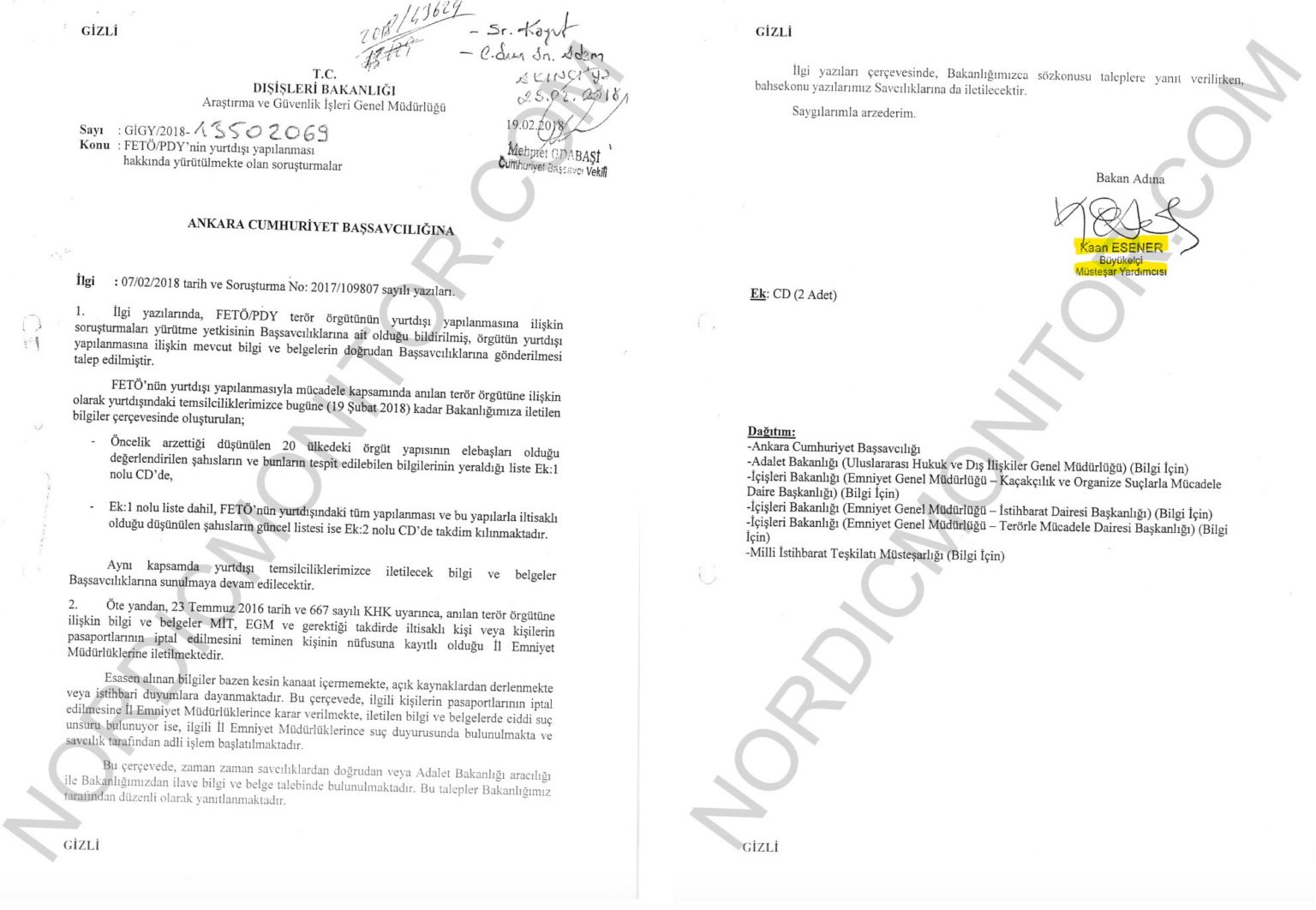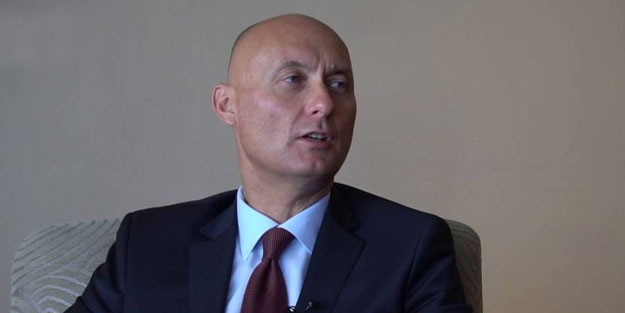Levent Kenez/Stockholm
Kaan Esener, a former ambassador and previous permanent representative of Turkey at the Council of Europe who ran a worldwide spying campaign against critics and opponents of President Recep Tayyip Erdogan in nearly 100 countries, was appointed head of the General Directorate for International Law at the Turkish Ministry of Foreign Affairs last week.
It was revealed In documents that surfaced in 2018 bearing the signature of Esener that diplomats posted to Turkey’s foreign missions were involved in spying on Erdogan’s critics.
Then-deputy undersecretary Esener had intelligence notes that had come through the ministry’s Security and Research Directorate distributed to the Ministry of Justice, the National Intelligence Organization (MİT) and relevant departments of the Security Directorate General. The distribution was intended for the purpose of initiating additional administrative or legal measures against individuals who had been profiled, punishing their relatives in Turkey and seizing their assets. According to these documents, thousands of citizens faced terrorism charges in legal proceedings.
Secret documents from the foreign ministry obtained by Nordic Monitor provide evidence that Turkish diplomatic and consular missions around the world have been systematically involved in monitoring individuals critical of President Erdogan. They also gathered information on Turkish citizens living in other countries, which was then transmitted to authorities at home.

Official communication sent by the Ministry of Foreign Affairs to the Ankara Chief Public Prosecutor’s Office included two CDs, with the first containing information about prominent critics of the Erdogan government in countries designated as priorities by the ministry.
The main focus of this surveillance was the Gülen movement, a civic group engaged in education, interfaith dialogue, cultural exchange and charitable activities across various nations. The movement, led by Turkish Muslim scholar Fethullah Gülen, resident in the United States, openly criticizes Erdogan’s government for corruption and its support of armed jihadist groups in Syria and elsewhere. Erdogan deemed the movement a terrorist organization following corruption investigations in December 2013 that implicated him, his family members and his associates in an Iran sanctions-evasion scheme. Erdogan accused Gülen of initiating the graft probes and orchestrating an abortive coup attempt in 2016, accusations that Gülen strongly denies.
The second CD includes detailed information about the movement’s structure in each country, along with a comprehensive list of individuals believed to be associated with it. These documents confirm an extensive and unprecedented level of spying conducted by Turkish diplomatic missions.
Public prosecutor Adem Akıncı, who received the foreign ministry document on February 23, 2018, forwarded the classified CDs to the organized crimes unit of the Ankara Police Department for further action against Turkish nationals who were profiled abroad by Turkish embassies and consulates. Akıncı also ordered the police unit to examine their affiliation with the Gülen movement and to present information about ongoing police investigations and arrest warrants issued for the suspects.
The immunities and privileges of diplomats and consular staff are governed by international conventions. However, diplomats enjoying the privileges and immunities described in the Vienna Convention on Diplomatic Relations are under a duty to respect the laws and regulations of the receiving state and to avoid interfering in its internal affairs as detailed in Article 41. Similarly, consular staff are granted limited privileges and immunities by the Vienna Convention on Consular Affairs, but the host state authorities can start investigations and prosecute any of the personnel if they perpetrate crimes inside or outside the consulate premises according to Article 43 of the convention.
Turkish diplomatic missions violated the domestic laws of receiving states and the principles of international law by conducting unlawful information-gathering campaigns and sweeping intelligence operations. Their spy work recorded officially by Turkish courts makes them vulnerable to international or local prosecution in foreign countries.

Furthermore, on November 25, 2022 former Vice President Fuat Oktay confirmed in parliament that MİT had brought more than 100 Erdogan critics back to Turkey by renditioning them from abroad.
In 2020 former foreign minister Mevlüt Çavuşoğlu confirmed that Turkish diplomatic missions were continuing their systematic surveillance of critics of the Turkish government operating overseas. Çavuşoğlu said Turkish diplomats assigned to embassies and consulates have officially been instructed by the government to conduct such activities abroad. “If you look at the definition of a diplomat, it is clear. … Intelligence gathering is the duty of diplomats,” Çavuşoğlu told Turkish journalists on February 16, 2020, following the Munich Security Conference, adding, “Intelligence gathering and information collection are a fact.”
In 2019 Esener protested journalist Can Dündar’s speech at a Council of Europe panel discussion, leaving the venue after leveling insults at Dündar. In response, Dündar tweeted, “I wish you could have stayed and faced me instead of listing lies and leaving. I’m sorry that you have to defend an oppressive regime on behalf of yourself. Whatever you do, you won’t be able to silence the voice of truth. But in the future, you will be ashamed of this speech. If you’re not ashamed, your children will be.”
Dündar had reported in 2015 that trucks belonging to MİT were transporting weapons to jihadist groups in Syria. As evidence, he presented footage from the prosecutor’s file. These images, later banned, revealed mortar shells and other ammunition hidden beneath boxes of medicine. Dündar who is also accused of membership in the Gülen movement, fled to Germany after his release pending trial in 2016. Following Dündar’s sentencing to 27 and a half years in prison in Turkey, a request for his extradition was denied by the German Foreign Ministry in 2020, citing a general principle of not extraditing individuals based on political convictions.
With the former head of MİT, Hakan Fidan, assuming the position of foreign minister in June, it is anticipated that the ministry will place even more emphasis on intelligence-related activities. According to a news article published by Nordic Monitor on Tuesday, Fidan has transferred numerous senior executives he worked with at MİT to the Ministry of Foreign Affairs.












